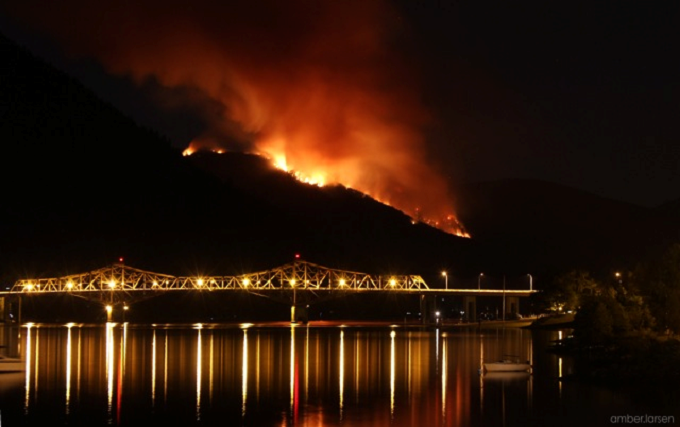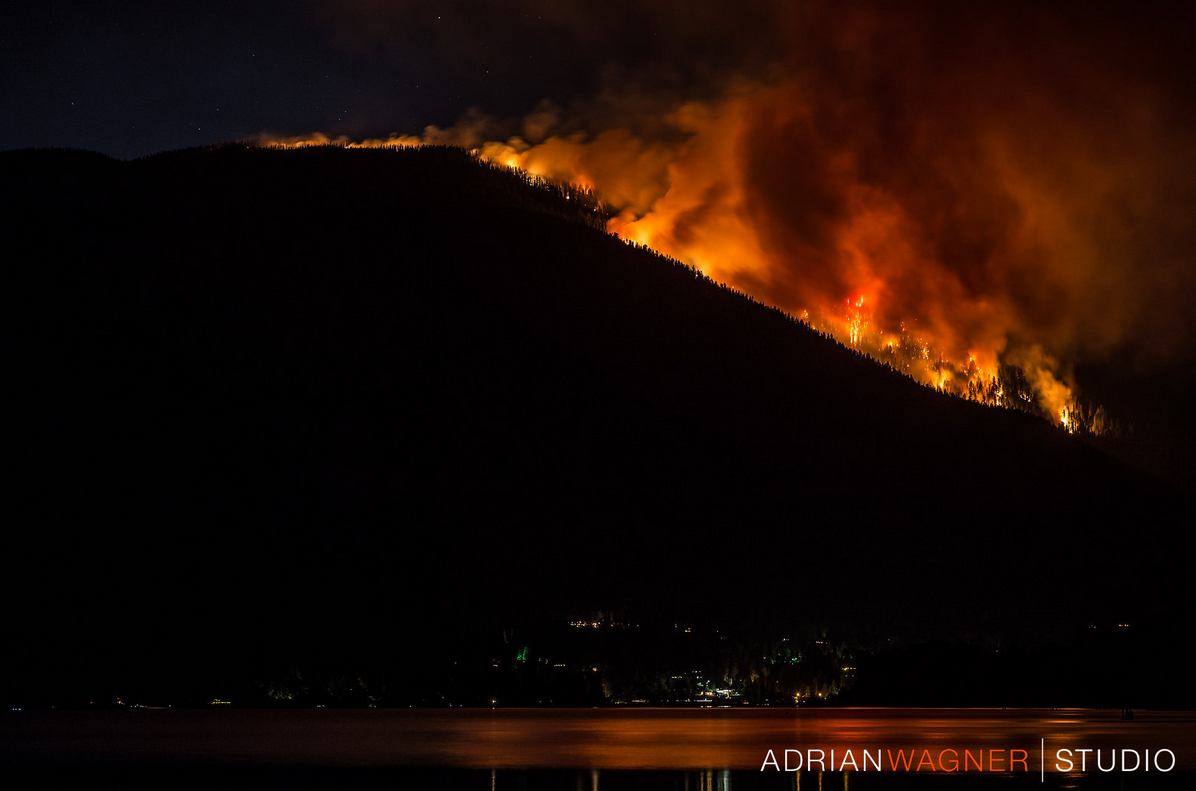WATCH: The air quality advisory remains in place over Metro Vancouver but it has been downgraded. The same can’t be said for Whistler. The air quality there worsened overnight now hitting the high-risk mark. Grace Ke reports.

Wildfires continue to burn across the province and while progress has been made on some fires, new ones are starting every day.
The B.C. Government says resources to fight the wildfires are at critical levels. Crews will prioritize new fires based on threats to humans and structures.
There are currently 189 active fires burning in the province. There were 30 new fires in B.C. on Tuesday and officials expect about 30 every day, on average, until conditions change. Eighteen fires are considered fires of note, with eight evacuation alerts or orders currently in effect.
Evacuation Orders currently exist in the following areas:
- Boulder Creek Wildfire, northwest of Pemberton Meadows
- Sechelt Mine fire, issued for Carlson Point, affecting 18 homes
- One home in Harrogate, north of Highway 95 near Brisco
Evacuation Alerts exist in these areas:
- Tsulquate Creek Fire, northwest of Port Hardy
- Sitkum Creek Fire, north of Kootenay Lake, between Sitkum and Duhamel Creeks
- East of Lake Koocanusa, east of Baynes Lake and Highway 93
- Harrogate, north of Highway 95, between Harrogate and Brisco
- Petitot River fire, northeast of Fort Nelson
As of July 7, approximately 40 homes in the province were on evacuation order with approximately 920 homes on evacuation alert. These numbers will fluctuate as orders and alerts are put into place and/or rescinded.
Sixty-three firefighters and seven other specialized personnel from Ontario arrived in Abbotsford and Cranbrook on Tuesday. They will be deployed throughout the Coastal Fire Centre and Southeast Fire Centre, based on current fire activity and where they will be needed most.
The province will also be getting help from Australian crews, while firefighters from New Zealand will likely head to Alberta.
In addition, two amphibious skimming aircraft, one birddog aircraft and an air attack officer from Ontario arrived in Kamloops on Tuesday.
Water restrictions in place; Some tickets issued
Metro Vancouver is urging all its residents to conserve water as it is currently supplying 1.6 billion litres of water every day. This is higher than any day in 2014.
Reservoirs are currently 75 per cent full, which is below normal for this time of year. Of the three watersheds that supply the region, the Coquitlam Reserviour is supplying about 50 per cent, with the remainder from Capilano and Seymour. There are three alpine lakes above the reservoirs available and all three are full. The plan is to open those lakes in July or August.
Water restrictions are in effect across Metro Vancouver.
Declaring that the Metro Vancouver region is in the second stage of a four-stage plan, the Commissioner of the GV Water District Carol Mason said in a statement, “over the last several years, our lawn sprinkling regulations have had a significant positive impact on reducing water demands in the peak summer season, and we are asking residents and businesses to further conserve water at this time.”
READ MORE: Metro Vancouver water restrictions lead to several warnings, but few tickets
Watering lawns is permitted in the morning but not during the evening hours when demand is highest for household use. The increased restrictions apply to lawn sprinkling only and not to watering flowers, vegetables, shrubs and trees.
The City of Vancouver says 600 warnings have been issued for breaking the water restrictions, but only two tickets have been issued.
In Coquitlam, 78 water violation complaints have been received since June 1. There have been 102 warnings issued but no tickets yet.
Two tickets for violating the water restrictions have been issued in Surrey, along with 213 warnings.
Don’t forget to ‘butt out’!
Fires started by discarded cigarettes are keeping crews busy in the hot and very dry conditions.
Vancouver Fire Rescue says they have responded to 36 smoking-related fires and seven unattended beach fires from June 30 to July 7. Four of those unattended fires were within the boundaries of Stanley Park.
Captain Jonathan Gormick says an examination of the smoking-related fires shows “they were typically at intersections where ostensibly a cigarette was flicked out of a car window.”
Surrey Fire Service has also seen an increase in “grass fires, bark mulch fires and fires in boulevards and along roadways, as a result of the hot dry weather and the careless disposal of smoking material,” according to Acting Assistant Chief Craig Leighton.
They responded to 60 calls about the small fires in only 12 hours on Sunday. That is compared to one call in the same time period one year ago.
On Tuesday, smoking and barbecues were banned in all District of North Vancouver parks and trails due to the extreme heat and dry conditions.
The District of West Vancouver already has a ban on barbecues and smoking in place.
Other communities have also banned smoking in public parks, including Nanaimo, Maple Ridge, New Westminster, Victoria, Delta and Vancouver.
A discarded cigarette can start a fire very quickly. Firefighters gave Global News a demonstration on Monday:
Just last week, four separate brush fires in West Vancouver were started in as many hours. Crews say they were all likely caused by discarded cigarettes.
Fire officials are reminding the public to ensure that cigarette butts are properly extinguished before being discarded.
As of noon on Wednesday, all campfires, open fires and fireworks will be banned throughout B.C.
READ MORE: Global BC’s full fire coverage
Photos of the fires in the Kootenays:
Air advisories in effect
A smokey haze continues to hang above Metro Vancouver and the Fraser Valley, keeping an air quality advisory still in effect today.
According to the latest Air Quality Health Index, the rating has been downgraded to 2, which is lower than the ratings Metro Vancouver has experienced over the past few days. Roger Quan, director of air quality for Metro Vancouver, said conditions worsened Monday as the smell of smoke permeated some parts of the region.
People living in Metro Vancouver, Fraser Valley, Howe Sound and the Sunshine Coast are being warned about the concentrations of fine particulate in the air. The levels are the highest in Whistler and Squamish. A special air quality advisory is now in effect for Whistler.
By the weekend, the South Coast should get some cooler temperatures and there is the possibility of a shower in some regions.
-with files from Jon Azpiri and Canadian Press


















Comments